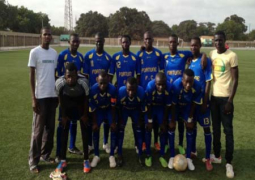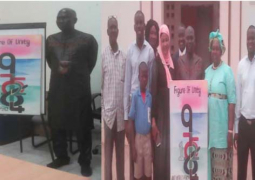
“These are feared to certainly lead to food insecurity,” said Amadou Bah, communications officer of FAO.
He made the statement recently following an eight-day tour, as part of implementation of the communication component of the FAO-implemented EU funded MDG1c project.
The tour was undertaken to improve visibility and advocacy with a view to ensure effective implementation of the project.
The tour parties assessed rural Gambian farmers benefiting from the MDG1c project which is meant to alleviate hunger and reduce poverty in the country.
According to statistics, in Central River Region (CRR) alone, an estimated 1,000 hectares in the Pacharr rice zone has not been cultivated in the previous rainy season due to floods and related incidence.
Mr Bah pointed out that if equipment were available and ploughing done on time, the disaster could be averted.
More than 130 farmers (3 in each community) were interviewed to gauge the impact of the project on the communities, and their level of preparedness to sustain the intervention after the project phased out.
Each interviewee gave his or her personal testimony regarding the impact of the project on their lives and livelihoods.
“The stories are indeed encouraging as they manifested FAO`s leading role in alleviating hunger, malnutrition, poverty and vulnerability on many individuals and householders in rural Gambia,” Mr Bah said.
The 7.6 million euro project funded by the EU is meant to improve food security through crop production intensification and school feeding programme.
The crop production component of the project, worth 5.5 million euros, is implemented by FAO in partnership with the Department of Agriculture.
Sang Pkeni, FAO technical adviser, during a visit to Bakadaji community rice field, said the WAA77 Improved Variety rice is salt tolerant that is why it was provided by the MDG1c project to farmers to enhance good harvest,
The beneficiary farmers also spoke of the advantages of the project in the agricultural development of their communities.However, they also highlighted challenges confronting them and appealed for further support to help improve production to sustain growth and satisfy local market demands.
Among the concerns of farmers are flood incidents, and the infestation by hippopotamus and bush pigs into rice fields.
The farmers said even though there are ongoing supports, the late delivery of farm inputs, harsh climatic conditions such as drought, heavy down pour of rain and floods, and lack of farming implements are also major factors undermining sustainability of their production and productivity.
The women, in particular, cited the lack of seeders and shine-hoes as a huge contributing factor to the entrenchment of poverty among rural women.
They lamented that they always plant late as they have to wait for the men to sow their seeds first because they all the same seeders.
The EU-funded MDG1c Project, implemented by FAO, is providing capacity building, fertilisers, seeds, seedlings, and milling machines to needy farming communities.



